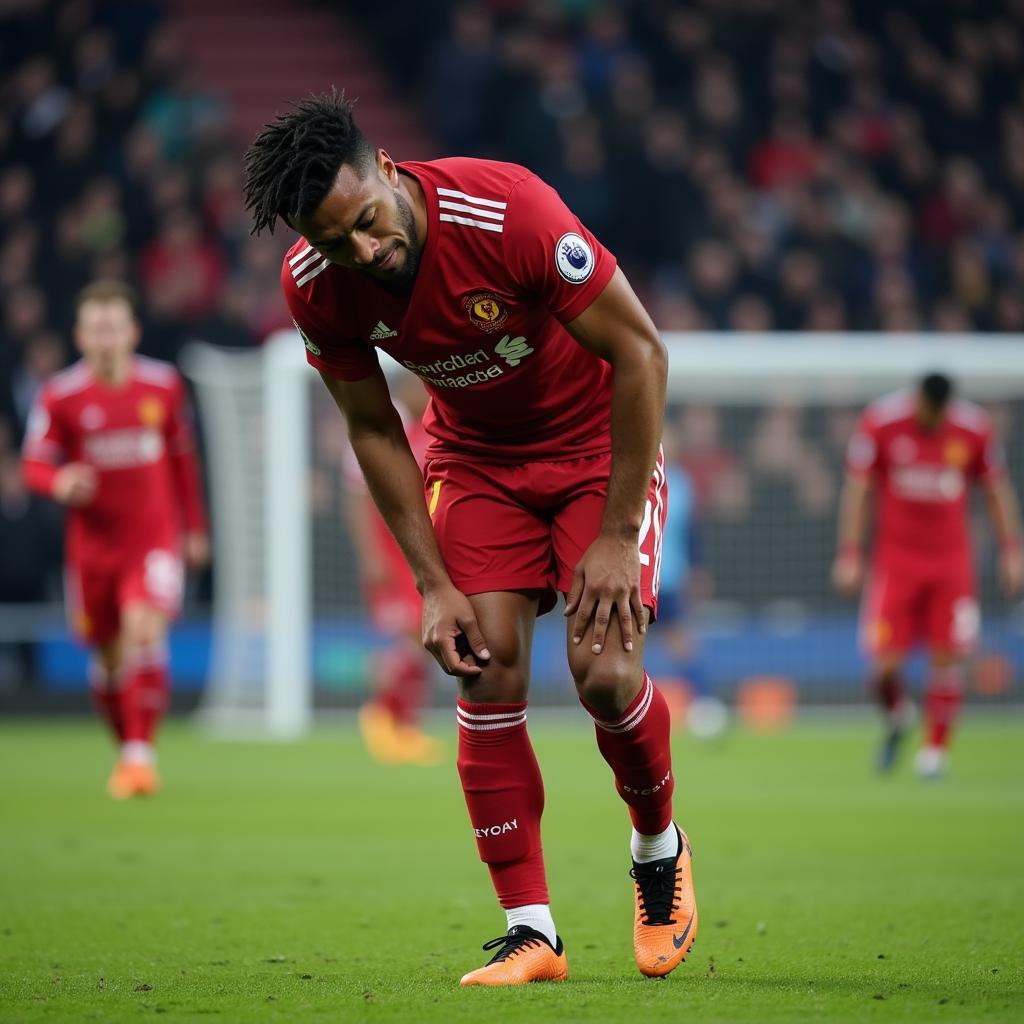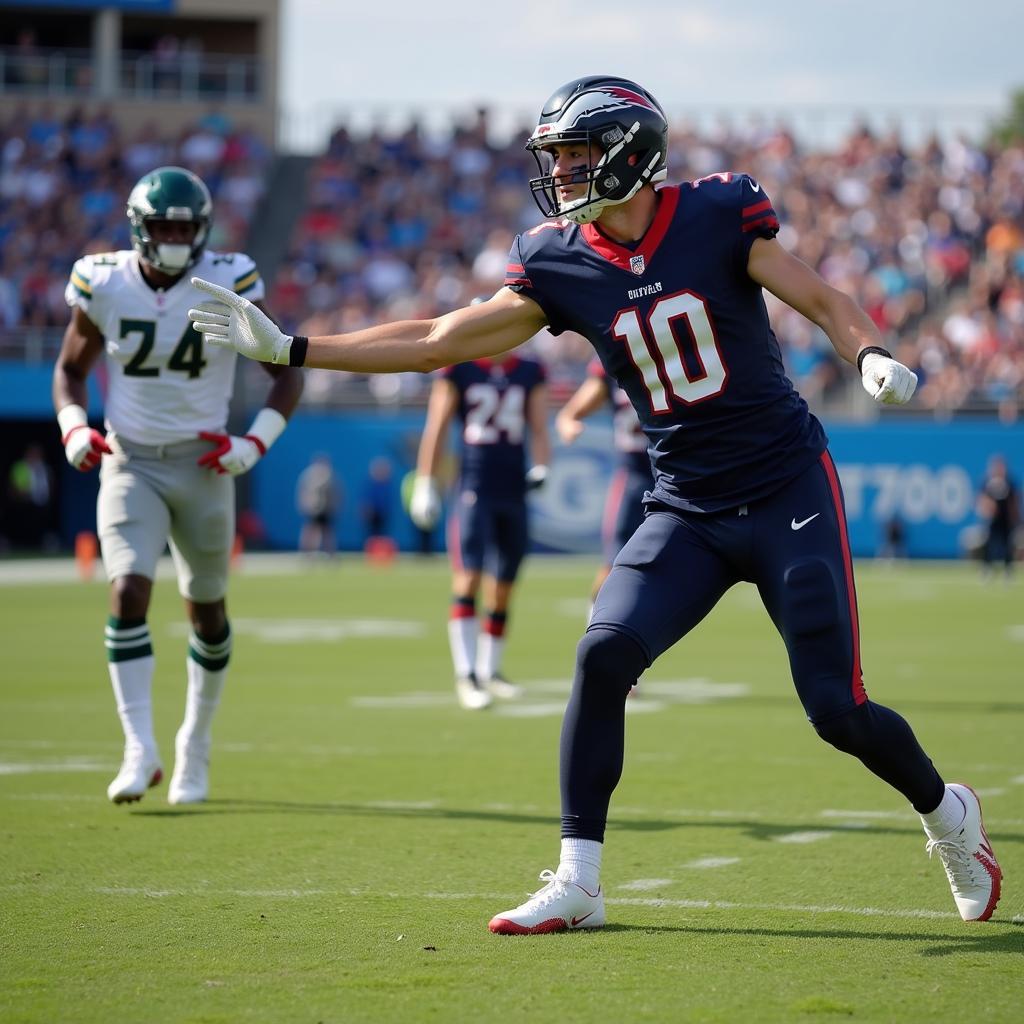Muscle Cramps in Football Players
November 6, 2024Muscle cramps are a common and often debilitating issue for football players. They can strike suddenly, interrupting a game and causing intense pain. Understanding why they occur, how to prevent them, and how to treat them is crucial for any player looking to perform at their peak.
Why Do Football Players Get Muscle Cramps?
Several factors contribute to muscle cramps in football players. Dehydration is a major culprit. Sweating profusely during intense exercise depletes the body of fluids and electrolytes, disrupting the delicate balance necessary for proper muscle function. Electrolyte imbalances, particularly low levels of sodium, potassium, magnesium, and calcium, can trigger these painful contractions.
Overexertion and muscle fatigue are also key players in the development of cramps. Football requires repeated high-intensity sprints, jumps, and changes in direction, placing significant stress on muscles. This can lead to an accumulation of metabolic byproducts like lactic acid, which further contributes to muscle irritability and cramping.
 Football Player Experiencing a Muscle Cramp Mid-Game
Football Player Experiencing a Muscle Cramp Mid-Game
Preventing Muscle Cramps: A Pro’s Guide
Preventing muscle cramps is often more effective than treating them once they occur. Hydration is paramount. Players should drink plenty of fluids, including water and electrolyte-rich sports drinks, before, during, and after training and matches. Paying attention to electrolyte intake is also vital. Including electrolyte-rich foods in your diet, such as bananas, oranges, and leafy greens, can help maintain the necessary balance.
Proper warm-up and cool-down routines are essential for preparing muscles for activity and promoting recovery. Dynamic stretching before exercise and static stretching afterward can improve flexibility and reduce the risk of cramps. Regular strength training can also help condition muscles and improve their resilience to fatigue.
 Football Player Stretching Before a Game
Football Player Stretching Before a Game
Treating Muscle Cramps: Fast Relief
Despite preventative measures, cramps can still happen. When they do, the first step is to stop the activity and gently stretch the affected muscle. Holding the stretch for 20-30 seconds can help alleviate the contraction. Applying heat to the cramped muscle can relax the muscle fibers and reduce pain. Conversely, applying ice can help numb the area and reduce inflammation. Replenishing fluids and electrolytes is crucial for restoring the body’s balance and promoting recovery.
“When a cramp hits, don’t panic,” advises Dr. James Peterson, a leading sports physician. “Gentle stretching, hydration, and electrolyte replenishment are your best allies in getting back on your feet quickly.”
How Diet Impacts Muscle Cramps
Nutrition plays a crucial role in muscle health and cramp prevention. A balanced diet rich in fruits, vegetables, and whole grains provides the essential vitamins and minerals necessary for optimal muscle function. Consuming adequate amounts of potassium, magnesium, and calcium is particularly important. These electrolytes play a key role in muscle contraction and relaxation.
“Many athletes underestimate the importance of a balanced diet,” says Emily Carter, a registered dietitian specializing in sports nutrition. “Proper nutrition is the foundation for peak performance and injury prevention.”
 Football Player Eating a Healthy Meal After Training
Football Player Eating a Healthy Meal After Training
Muscle Cramps vs. Muscle Strains: Knowing the Difference
It’s important to distinguish between muscle cramps and muscle strains. While both can cause pain, they are distinct conditions. A muscle cramp is a sudden, involuntary contraction of a muscle, while a muscle strain is an injury to the muscle fibers caused by overstretching or tearing. Strains typically involve localized pain, swelling, and bruising, and require a longer recovery period.
Conclusion
Muscle cramps are a common challenge for football players, but understanding their causes and implementing preventative measures can significantly reduce their occurrence. Prioritizing hydration, proper nutrition, and appropriate training techniques are key to staying cramp-free and performing at your best. Remember, taking care of your body is essential for success on the field.
FAQ
- What is the most common cause of muscle cramps in football players? Dehydration and electrolyte imbalance are the most common culprits.
- How can I prevent muscle cramps during a game? Hydrate consistently throughout the game with electrolyte-rich fluids.
- What should I do if I get a cramp during a match? Stop playing, gently stretch the affected muscle, and rehydrate.
- What are the best foods to eat to prevent muscle cramps? Foods rich in potassium, magnesium, and calcium like bananas, spinach, and almonds.
- Are muscle cramps and muscle strains the same thing? No, cramps are involuntary contractions, while strains are muscle fiber injuries.
- How long does it typically take for a muscle cramp to go away? Cramps typically subside within a few minutes to an hour with proper treatment.
- Can certain medications contribute to muscle cramps? Yes, some medications can increase the risk of muscle cramps. Consult your doctor.
Need support? Contact us: Phone: 0396443476, Email: [email protected] Or visit us at: 23 Tháng 3, Đắk Nia, Gia Nghĩa, Đắk Nông, Việt Nam. We have a 24/7 customer service team.